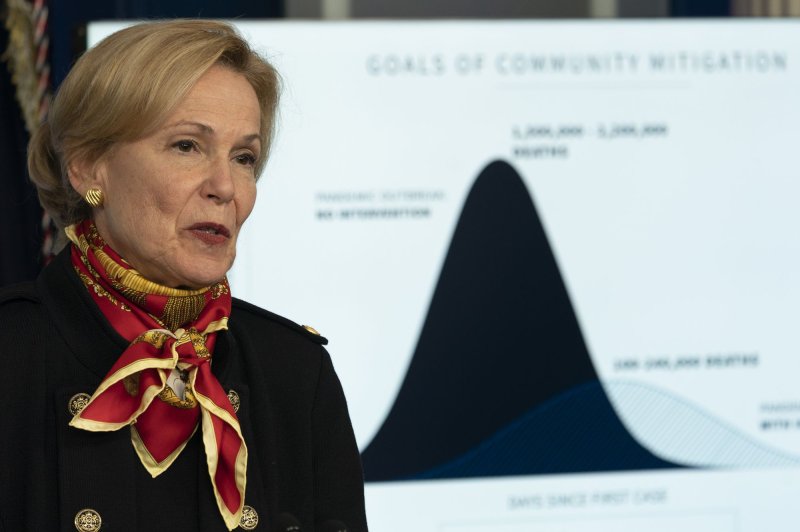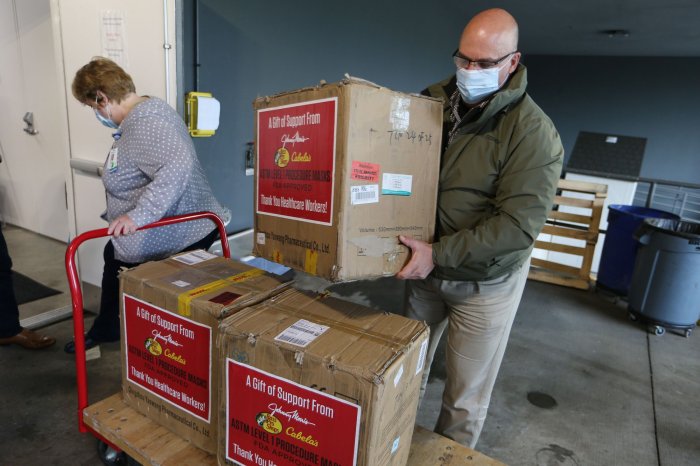1 of 3 | White House Coronavirus Response Coordinator Ambassador Dr. Deborah Birx on Tuesday presented projections that as many as 200,000 Americans may die as a result of the COVID-19 outbreak. Photo by Chris Kleponis/UPI |
License Photo
March 31 (UPI) -- White House experts on Tuesday shared projections that up to 200,000 Americans may die as a result of the COVID-19 outbreak.
During a briefing by the White House Coronavirus Task Force, Dr. Deborah Birx shared figures projecting that the virus had the potential to kill between 1.5 million and 2.2 million Americans without mitigation and could still lead to 100,000 to 200,000 deaths even if mitigation efforts including "stay-at-home" orders issued in many states continue.
The task force based its projections on data from the outbreak in Italy and various models including information from Institute of Health Metrics and Evaluation Director Chris Murray.
"We think that that is the range. We really believe and hope every day that we can do much better than that because that is not assuming 100 percent of every American does everything that they're supposed to be doing," Birx said.
Vice President Mike Pence said 1.1 million Americans have been tested for the coronavirus. Data gathered by Johns Hopkins University showed there were 181,183 confirmed cases in the United States and 3,721 deaths as of Tuesday evening,
Birx said deaths are projected to peak during the next two weeks and will decline at a slower pace than they rose. President Donald Trump warned Americans to brace for a difficult period.
"I want every American to be prepared for the hard days that lie ahead. We're going to go through a very tough two weeks," he said.
Director of the National Institute of Allergy and Infectious Diseases Dr. Anthony Fauci added that deaths from the virus will continue to occur even after the number of reported cases throughout the nation decreases.
"When the increase in new cases begin to level off, the secondary effect is less hospitalizations, the next effect is less intensive care and the next effect is less deaths," he said.
Bass Pro Shops marketing manager David Smith (R) carries a box of donated face masks into Mercy Health in Chesterfield, Mo., on May 13. The company is donating 1 million FDA-approved ASTM Level 1 Procedure Face Masks to healthcare workers and first responders working on the front lines of the pandemic. Photo by Bill Greenblatt/UPI |
License Photo
New York has become an epicenter for the virus in the United States, surpassing 75,000 cases and 1,550 deaths on Tuesday.
Fauci said the task force's goal is for Americans to closely practice social distancing and other mitigation guidelines to prevent other large cities from experiencing a similar spread.
"Our goal ... is to get the hotspot places, the New Yorks, the New Jersey and help them to get around that curve but as importantly to prevent those clusters of areas that have not gone to that spike, to prevent them from getting to that spike," he said.
The projections were presented to Trump before he moved on Sunday to extend federal social distancing guidelines -- originally scheduled to end Tuesday -- through April 30.
Trump on Monday said a national stay-at-home order, like those that have called for Americans to remain in their homes and for non-essential businesses to shut down, is unlikely.
On Tuesday, Trump and Pence reasserted that they would allow states to issue their own orders with Trump adding the White House would only intervene in cases in which they observe actions that are "obviously wrong" by state and local leaders.
"At the president's direction, the White House Coronavirus Task Force will continue to take the posture that we will defer to state and local health authorities on any measures that they deem appropriate," Pence said.
Maine Gov. Janet Mills on Tuesday issued a directive requiring residents to stay at home at all times unless for "an essential job or an essential personal reason" including obtaining food, medicine or healthcare, limiting the number of people in essential stores, prohibiting the use of public transportation and ending in-person instruction at schools until at least May 1.
Texas Gov. Gregg Abbott also issued a similar order requiring Texans to only leave their homes for essential work or to access essential services including groceries until April 30 and closing schools until May 4.
As of Tuesday, North Carolina, Delaware, New Jersey, New York, Vermont, Massachusetts, New Hampshire, Maine, Rhode Island, Maryland, Ohio, Virginia, West Virginia, Michigan, Indiana, Illinois, Tennessee, Wisconsin, Louisiana, Kansas, Minnesota, Colorado, Arizona, New Mexico, California, Oregon, Idaho, Montana, Washington, Hawaii, Alaska and Washington, D.C., have implemented orders urging people to remain in their homes and closing non-essential businesses. Alabama, Pennsylvania, Connecticut, Kentucky and Nevada have issued orders closing non-essential businesses due to the virus.
















